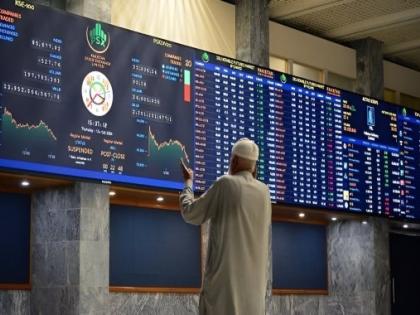Operation Sindoor: Pakistan Stock Market Plunges 6% After Indian Army Strikes Back After Pahalgam Attack
By Lokmat English Desk | Updated: May 7, 2025 11:42 IST2025-05-07T11:40:54+5:302025-05-07T11:42:12+5:30
The Pakistan stock market suffered a steep decline on Wednesday, reacting sharply to heightened geopolitical tensions following India’s overnight ...

Operation Sindoor: Pakistan Stock Market Plunges 6% After Indian Army Strikes Back After Pahalgam Attack
The Pakistan stock market suffered a steep decline on Wednesday, reacting sharply to heightened geopolitical tensions following India’s overnight military strikes on nine terrorist targets in Pakistan and Pakistan-occupied Kashmir. The operation, codenamed Operation Sindoor, was launched in retaliation to the recent terror attack in Pahalgam, Jammu & Kashmir.The benchmark KSE-100 index at the Pakistan Stock Exchange plunged by 6,272 points, or nearly 6 per cent, during early trading, hitting a low of 107,296.64 compared to Tuesday’s close of 113,568.51.
This sharp sell-off reflects investor anxiety over the escalating conflict and the potential for prolonged instability in the region. Since the deadly attack in Pahalgam on April 22, tensions have surged between India and Pakistan. The KSE-100 index has seen a cumulative decline of approximately 4% in the weeks that followed. Between April 23 and May 5 alone, the index dropped by 3.7%, largely driven by fears of military escalation and its economic fallout.
In stark contrast, Indian markets have shown relative resilience. Although the BSE Sensex initially dropped by 692 points to 79,948.80 from its previous close of 80,641.07, it quickly rebounded, gaining over 200 points to touch 80,845. By 10 AM, the Sensex had recovered to just 32 points below the previous close, down only 0.04%, while the Nifty 50 slipped slightly by 19 points, or 0.08%, to 24,361.Market analysts attribute the initial volatility in Indian indices to short-term geopolitical uncertainty. However, historical trends suggest that Indian markets tend to rebound robustly following similar episodes of conflict. After the 1999 Kargil War, the Sensex surged 63% within a year.
Following the 2001 Parliament attack, it rose by over 20% in the subsequent year. Similarly, post-Mumbai attacks in 2008, the index climbed 60%, and after the 2019 Balakot airstrikes, it ended the year up by 15%.“Geopolitical tensions like the ongoing Indo-Pak standoff under Operation Sindoor tend to cause immediate market volatility, as seen with the Nifty and Sensex dropping 0.6–0.8% recently. However, markets have consistently rebounded in the long term,” said a senior analyst at a Mumbai-based brokerage.
Open in app